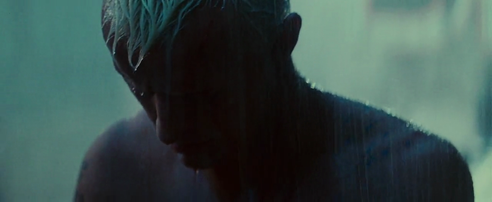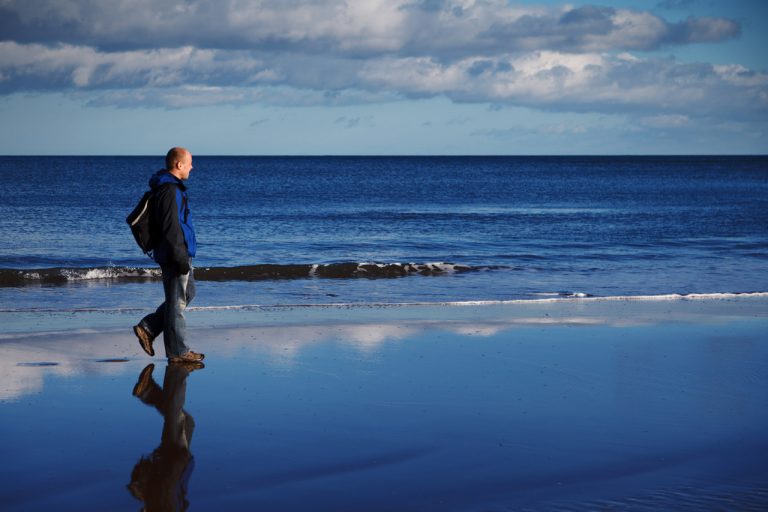
The biggest curse to befall mankind is the sure and certain knowledge that one day we will all die.
This knowing, this understanding can cast a long shadow over a man’s life, making him realise that all of acts, deeds, accomplishments and favours will come to nothing, being eradicated by the relentless march of time.
Everyone you know will die, all things that have been achieved by all men in all times eventually come undone. Nothing lasts forever, empires fade and the world is forever changing, and that is all down to death.
The adoption of this mental state is called Nihilism and seen collectively all around the world as a bad thing in much the same way that pessimistic people are seen as bad company.
The thing with Nihilism though is that it’s not all bad, there is a great deal of honour and understanding to be had when you face up to your own mortality and the mortality of other people, places or things.
Most people prefer not to think about it and won’t even acknowledge that they themselves are going to die.
“All men think all men mortal but themselves.”
Edward Young
They deny it so much that it can form a mental complex and cast a long shadow over everything that they do. Even the most joyous of experiences can be spoilt and drained of happiness by the unbidden thought that reminds you that one day you will be dead and all of this fun and happiness, experience and wisdom, or in short everything that you are; your whole persona will be dead with you, having dissolved back into the nothingness that first spawned it.

“I’ve seen things you people wouldn’t believe. Attack ships on fire off the shoulder of Orion. I watched C-beams glitter in the dark near the Tannhäuser Gate. All those moments will be lost in time, like tears in rain. Time to die.”
Roy Batty – Blade Runner.
Descendents of Adam.
I was one of these people. I grew up on Sci-Fi and have always been a passionate supporter of popular science. I’d read with delight some new article about life extension or a new treatment to counteract the effects of free radicals, or how in the future the average human being will be kept alive by stunning breakthroughs in genetics, cyber technology and cloning techniques so we’ll be alive and well, fit, healthy and forever young for as much as a thousand years like the biblical prophets of old.
Human beings would eventually defeat entropy!
Hell, one day we might even digitise consciousness and transfer it from body to body and live in a world of transhumanism and ‘ego-casting,’ as brilliantly portrayed in the Altered Carbon novels of Richard Morgan.
Stoicism
I lived in hope, but the one thing you must not have if you are a true stoic is hope, because hope will raise you higher only to dash you against the rocks time after time, with all of the misery that entails.
The true stoic is a realist, so I knew (thanks to the work of Carl Jung and others) that these unbidden thoughts were the result of my unconscious trying to tell me something, and that ‘something,’ was that I had to deal with the fear of my impending mortality head on. That one day I would be alive and moments later I would not be, even if a breakthrough was eventually made, it might not be in time for me.
Anyhow, I could always get run over by a bus, probably just after leaving the immortality clinic…
So I waited until the house was empty and found the nearest mirror and then I looked myself in the eye and did the hardest thing that I’ve ever done in my life.
I simply said…
“I understand that one day I will die, but between now and then I will do the best that I can to live the best life that I can.”
It was a strange and cathartic experience that for once allowed me to sleep soundly, not immediately but over time, a gentle peace descended upon me and slowly the fear and negativity surrounding death diminished to the point that now I don’t care.
It’s been over ten years since I did this and I feel exactly the same way now, if anything my indifference or stoic apathy (apatheia) to death has increased, so I care even less about it now, more so as time goes on.
“Do the thing you fear most and the death of fear is certain.”
Mark Twain.
The Good life
Death can happen in the next five minutes or the next fifty years for all I care. It won’t stop me living in between and living well at that.
“It’s Not the Years in Your Life That Count. It’s the Life in Your Years,”
Edward J. Stieglitz
More importantly it also laid the groundwork for future work on this subject, work that reframes the whole idea of death away from the negative, but to the positive, which is where it should be.
Death is as positive a thing as birth for many different reasons, one of which being that the dying man is honourably getting out of the way and making room for someone else.
“Why should I fear death? If I am, death is not. If death is, I am not. Why should I fear that which cannot exist when I do?”
Epicurus
Absurdism
Nothing else has changed though, I haven’t committed philosophical suicide by turning to religion or tried to end it all by throwing myself of a bridge. This is apparently a strong temptation to those mired in passive nihilism (a term invented by Nietzsche) who advocated that we become active nihilists and do our best to live well and remove suffering from our lives.
Despite being remembered as a Nihilist Nietzsche was anything but. He actively challenged the dangerous and regressive mental state of passive nihilism that results in chronic or morbid depression. In doing so he created the conditions for Albert Camus to create a the life affirming philosophy of Absurdism.
The absurd man.
Albert Camus teachings revolve around the very simple yet elaborate idea that existence itself is an absurd condition. There’s clearly no rhyme or reason to the big questions of existence and nothing can be reliably proven beyond that which we can observe and test with reason, but reason isn’t enough. It isn’t possible to understand it all, there are things that we will never know as they are simply beyond the scope of human beings to know them or to discover them.
We can understand how the universe works, but not how it began. We can predict how it will end and along the way understand many facets of its deterministic operations, but we still don’t know why it’s here, what initially created the conditions necessary for a big bang or even if it’s meant to have any purpose at all.
Welcome to the absurd.
Camus proposed that ‘the absurd,’ is an uncomfortable state for all people that ponder it, so much so that many people try to end it by committing philosophical suicide and turning to spirituality. Likewise real death at your own hands (i.e. actual suicide) is also as an attempt to end the absurd.’
Many a thinker, ponderer or philosopher have turned to religion or committed actual suicide over the long centuries of human civilisation. Camus saw both options as equally bad.
Religion attempts to provide meaning where none can be proven by providing structure, a sense of place in the cosmos and an escape route (usually to paradise) out of the absurd condition and all of the human suffering that goes along with it.
“Those who lack the courage will always find a philosophy to justify it.”
Albert Camus
Albert Camus urged us all to challenge this, to hang on to the sense of the absurd, recognising that the absurd condition was caused by both the universe and the human being observing it. Should one or the other disappear then the absurd could not exist, both were needed to maintain it.
The absurd was in a sense the quintessential state of the human mind trying it’s best to piece it all together. I would go further and say that the absurd is the source of all feelings of transcendence and enlightenment.
Despite the fact that no meaning can be found, Camus urged us all to recognise this and keep on looking anyway, because to do so would keep alive the sense of the absurd and provide purpose, direction and meaning to our lives that would not be false and in doing so triumph over the state of passive Nihilism that Nietzsche urged us all to avoid at all costs.
“In the depth of winter I finally learned that there was in me an invincible summer.”
Albert Camus
This is the state of happy nihilism that I’ve written about in an earlier article that you can read by clicking here.
Some people see Nihilism as a way of avoiding responsibility by ultimately stating that everything is meaningless, why do anything at all? What’s the point right?
It matters now!
This is only true because some Nihilists inflate the frame of reference so much that everything is senseless. Whilst it might be true that in a billion years your actions won’t count for anything, and whatever they do count for will count for even less when entropy runs down the clock of the universe even further, the point is that what you do matters now!.
It matters to someone now, it matters to your friends, your families, hell it even matters to your enemies. You do matter, right now, but not in a million years. This is especially important when you sit back and realise that your direct perception of life isn’t in the known past or the unpredictable future it’s rooted right here in the now.
What you do matters now, so do it well and enjoy it!
“Basically, at the very bottom of life, which seduces us all, there is only absurdity, and more absurdity. And maybe that’s what gives us our joy for living, because the only thing that can defeat absurdity is lucidity.”
Albert Camus
Camus practiced what he preached, he had multiple girlfriends, wore the most fashionable clothes, attended the best parties and generally lived well. He had succumbed to happy nihilism, (or active Nihilism as described by Nietzsche) and I hope you all do too.
You can just choose to be happy anyway, affirm life, have fun, do what pleases you and enjoy your spot in the sun knowing full well that it will not and cannot last. This shouldn’t make you sad, quite the opposite in fact. It should make you happy that you are here at all and able to enjoy it amongst the best times in human history too. You are already as lucky as a texas billionaire who’s just won the lottery for the third time.
Relax, have fun, we’re all going to die.
It’s important to realise that like or not you are an emanation of the universe and you are needed to maintain the absurd, you might see yourself as a simple flash of light against an eternity of blackness, but the truth is far greater.
You are one of many flashes that light up the night sky, punctuating the darkness with their brilliance in the longest fireworks show in history.
Hard Determinism.
The fact that you cannot see the final pattern is irrelevant, do your best to understand that there is a pattern and that you have a place within it in the same way that musical notes are meaningless by themselves and are defined by the silence that precedes them, but when listened to inform the tone and duration of the next note in a beautiful symphony that will play for billions of years.
An individual note is meaningless, but together they form a concert. Seeking meaning in the concert is the absurd as so beautifully written about by Albert Camus.
Consider this, all matter in the universe is energy, it’s all in motion or vibrating away, slowly expanding and coalescing, changing form, in an atomic cloud that is billions of light years across.
Amongst that atomic cloud is a particular arrangement of atoms that we call the Solar System and within that there is of course planet Earth, one of many planets that have formed in response to physical laws into the life spawning world that we know today.
Everything, every action determines the next action, every event, every atom that interacts with another have all collectively shaped this universe to be what it is today, and all of this is predictable when you understand physical laws.
If you could know all things you’d be able to trace your origins right the way back to the big bang and forward again through every interaction of matter and force to where you are today. Matter and force being the principle drivers behind chemistry which in turn drive biological life via evolution which in turn shapes societal life and family interactions in the human being.
If you could know all things you’d be able to predict with 100% accuracy exactly what it is that someone will do next.
You would even be able to predict their choice of friends, what they’d eat and other minutiae right the way down to the choice of clothes they’d wear and how many brush strokes they’d use to clean their teeth.
This might make the idea of free will and freedom of choice untenable, but all of the evidence suggests that it’s probably true. In this model all a person can do is react in a variety of different yet predictable ways to stimuli. In other words every actions leads to a corresponding reaction.
What is true for the particle is also true for the individual being.
Determinism has some interesting ramifications, namely that you have to be here.
Your life was pre-ordained by the unfolding of physical laws at the moment of the big bang.
I shall never believe that God plays dice with the world.
Albert Einstein
There’s been billions of trillions of physical interactions between now and then, but if all of them could be known and the clock started again then you’d get the same result every single time.
The universe is not random and the consequences of that result is that you’d have to exist, in the same place, at the same time, with the same name and the same DNA, doing the same things.
In every new hypothetical universe that follows the same rules with the same set of initial conditions you have to exist.
Let’s let that sink in for a few minutes…
Science, philosophy and rationality teach us that you have to be here. You have no other choice. You must exist.
When the penny drops and the idea finally permeates into your being that you have to be here now, that the universe couldn’t exist without you as indeed you cannot exist without it then you’ll no longer need a religion.
If you think on this further you will realise that you are in fact in a symbiotic relationship with the universe it needs you as much as you need it, and this condition is the basis for the absurd, which is why I say that the absurd is the basis for all sensations of transcendence.
When you look up at the night sky and see the glow of the cosmos, that feeling of awe you may get is a manifestation of the absurd. It’s the universe staring back at you saying ‘go on, define me, I dare you to.’
The absurd is life itself.
“At any street corner the feeling of absurdity can strike any man in the face.”
Albert Camus
So relax everyone, we’re all going to die, but it’s not for nothing. It’s for something and that something is the experience of the absurd and that happens now.


Where can I talk to you, Comicus? You’re brilliant, and have made me feel a lot better about my near-Nihilistic school of thought.
Thanks Jay, very nice of you to comment, you see Nihilism isn’t as bleak as people make it out to be… Glad you liked it.
you should read up on deterministic chaos. if you make a conclusion after quoting einstein, you are basically ignoring half a century of achievements in theoretical physics (and other sciences).
Thanks for that Zuta, I will look to add that topic to my reading list, I do like quantum physics but despite my studies I never really feel that I can grasp it as well as I’d like. I admit that I haven’t heard of the term ‘deterministic chaos,’ so thank you for letting me know. All the best, Comicus.
Your post had me thinking about Dylan Thomas:
Never until the mankind making
Bird beast and flower
Fathering and all humbling darkness
Tells with silence the last light breaking
And the still hour
Is come of the sea tumbling in harness
And I must enter again the round
Zion of the water bead
And the synagogue of the ear of corn
Shall I let pray the shadow of a sound
Or sow my salt seed
In the least valley of sackcloth to mourn
The majesty and burning of the child’s death.
I shall not murder
The mankind of her going with a grave truth
Nor blaspheme down the stations of the breath
With any further
Elegy of innocence and youth.
Deep with the first dead lies London’s daughter,
Robed in the long friends,
The grains beyond age, the dark veins of her mother,
Secret by the unmourning water
Of the riding Thames.
After the first death, there is no other.